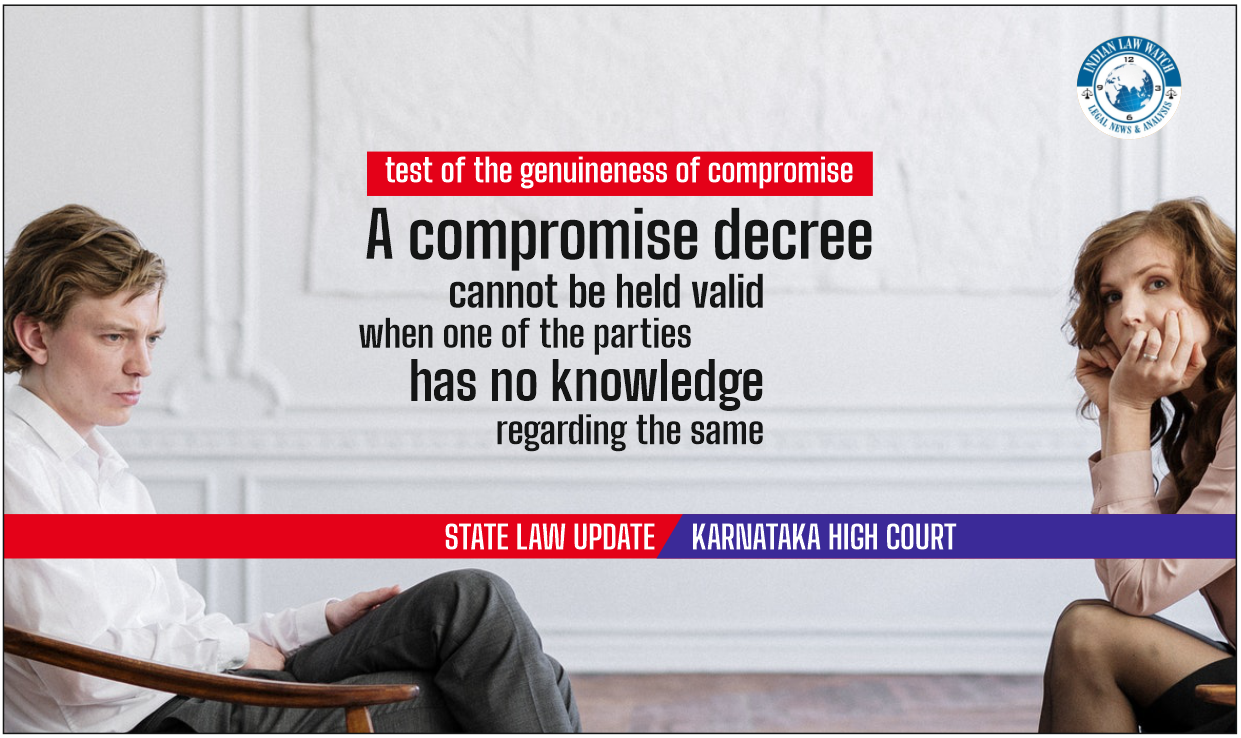

In Smt. Renuka W/O Anand v. Sri Ramanand, the Karnataka High Court held that a compromise decree cannot be held valid when one of the parties has no knowledge regarding the same. The Court further provided guidelines for testing the genuineness of compromise.

Factual Background
A compromise petition was filed in OS No. 246 of 2014 before Principal Senior Civil Judge, Hubballi in a Lok Adalat proceedings on behalf of the petitioner by a person claiming to hold power of attorney for the suit scheduled property. Consequently, a compromise decree was passed.
The petitioner before the Karnataka High Court pleads for setting aside the compromise decree on the ground that she had no knowledge of such compromise. The petitioner further provided that no power of attorney was executed in favour of the respondent and therefore, the power of attorney used for obtaining the compromise decree is a fabricated one.
Whether the compromise decree was valid?
The Court observed that the petitioner had no knowledge of the proceedings while the compromise decree was passed against her. It further observed that neither the petitioner was served with any notice nor the defendant contested the proceedings.
The Court termed the practice of referring a compromise petition to Lok Adalat for recording of compromise as a ‘procedural irregularity’. The Court relied on the decision of Smt. Akkubai v. Shri Venkatrao and others and observed that the practice of recording compromise by the Court and then referring it to Lok Adalat is not contemplated by the Legal Services Authorities Act, 1987 and therefore, such compromises should be set aside.
Guidelines upon the genuineness of compromise
In addition, the Karnataka High Court issued the following guidelines in the instant case, to test the genuineness of compromise:
i) When a compromise is filed before the Court in terms of the decision in Smt.Akkubai vs. Shri Venkatrao and Others, it is for the Court to record the compromise and not refer the matter to the Lok Adalat.
ii) It is only if there is no settlement arrived at before the Court and the parties request for the matter to be referred to Lok-Adalat to enable a settlement then in such event the parties are to be referred to the Lok Adalat and in the event of a compromise being arrived at before the Lok Adalat, the same could be recorded by the Lok Adalat.
iii) When the matter is referred to Lok Adalat, separate order sheets would have to be opened and maintained by the said Lok Adalat and the order sheet of the Court in the suit cannot be used by the Lok Adalat.
iv) The trial Court and or the Lok Adalat while recording compromise is required to ascertain if the parties are present personally as also to ascertain and verify their identities by production of suitable documentary proof.
v) In the event of a power of attorney appearing, it would be the bounden duty of the Court or the Lok Adalat to ascertain if the concerned party has been served with notice.
vi) The Court as also the Lok Adalat would always have to be suspicious if the party were to enter appearance even before service of notice which is a red flag that there is something that is fishy in the matter.
vii) When recording a compromise being entered into by a power of attorney, the original of the power of attorney is required to be examined by the Court and the Lok-Adalat and necessary endorsement made in the order to that effect and the original power of attorney returned to the parties.
viii) As far as possible the trial Court and or the Lok Adalat to secure the presence of the party and obtain signature of such party rather than the power of attorney.
ix) The Trial Courts shall ensure that proper and acceptable proof of identity of the parties to proceedings as mandated by the Government for various purposes (such as Aadhar Card, Driving License, Passport Copy, Election Identity card, etc.) are obtained as a matter of rule.





